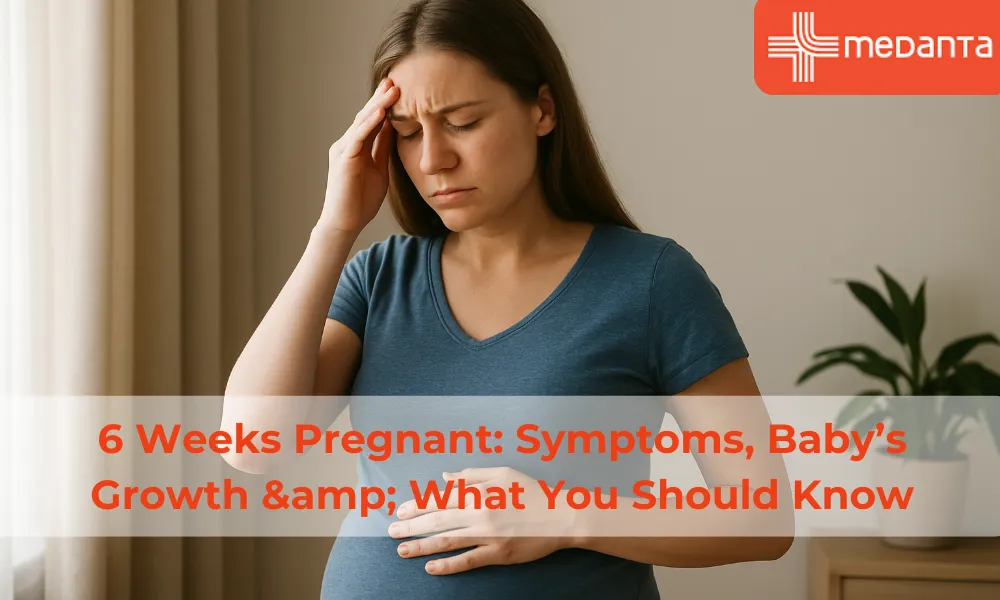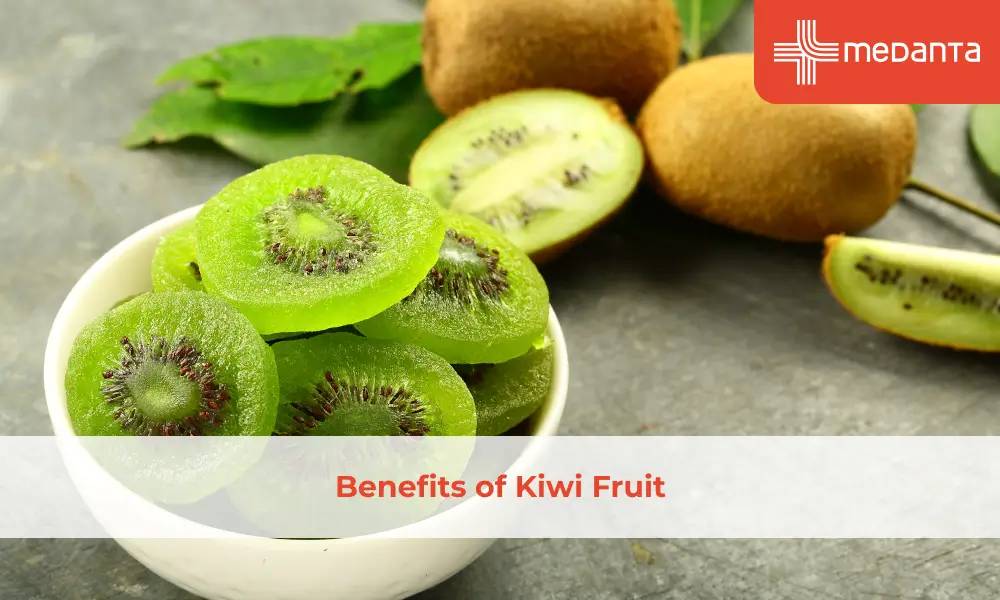6 Weeks Pregnant: Symptoms, Baby’s Growth & What You Should Know

TABLE OF CONTENTS
- Common Symptoms at 6 Weeks (Cramping & Nausea)
- Hormonal and Emotional Changes in the Mother
- Baby's Size and Development at Week 6
- When to Book Your First Prenatal Check-up
- Foods and Lifestyle to Support Early Pregnancy
- Warning Signs You Shouldn't Ignore
- Coping with Morning Sickness and Fatigue
- Conclusion
- FAQs
Your tiny baby grows from 2 to 5 millimetres in length during week 6 of pregnancy, which brings amazing changes. The size might be comparable to a sweet pea or grain of rice, but the most important development happens during this remarkable week. The baby's heart beats for the first time, and blood starts circulating throughout the developing body.
Many mothers experience their first pregnancy symptoms at this stage. The signs become more noticeable and include morning sickness, fatigue and tender breasts. The baby's development reaches a vital milestone too - doctors will start calling the embryo a foetus by week 9.
The baby's face starts taking shape this week as the cheeks, chin and jaws begin to form. Small buds that will become arms appear by week's end, and the neural tube along the baby's back continues to close. This forms the brain and spinal cord. Pregnancy lasts about 40 weeks, but these early weeks hold some of the most significant developmental milestones.
Common Symptoms at 6 Weeks (Cramping & Nausea)
Week 6 is a vital time in pregnancy when many mothers first notice the most important bodily changes. The hormonal surge that supports your baby's growth brings noticeable symptoms.
Your uterus expands to accommodate your growing baby, which might cause mild cramping. About 70-80% of women experience nausea (morning sickness) that can occur at any time of day. Tender breasts, frequent urination, and extreme fatigue are other common symptoms.
Hormonal and Emotional Changes in the Mother
Physical symptoms emerge from rising levels of hCG and progesterone. Hormonal fluctuations affect brain chemicals and cause mood swings that peak between weeks 6-10. Emotional extremes range from excitement to anxiety for many women.
Baby's Size and Development at Week 6
Your baby measures about 3-5mm in length, like a sweet pea or grain of rice. The heart begins as a simple tube and starts beating remarkably this week. The neural tube—which becomes the brain and spinal cord—closes. Small buds that develop into arms and legs appear, while facial features start forming.
When to Book Your First Prenatal Check-up
Your first prenatal visit usually happens between 6-8 weeks. This appointment creates the foundation for your pregnancy care and gives you a chance to discuss concerns.
Foods and Lifestyle to Support Early Pregnancy
Prenatal vitamins containing folic acid remain essential.
Small, frequent meals help manage nausea, and staying hydrated is crucial.
Your daily caffeine intake should not exceed 200mg, and you must avoid alcohol completely.
You should add dairy products like milk, curd, and paneer for essential calcium and protein.
Add whole grains and leafy green vegetables to complete your folate, iron, and fibre needs.
You should include walking or gentle prenatal yoga in your daily schedule.
Get at least 7–9 hours of good night sleep and small naps in the afternoon.
Take your doctor's prescribed supplements regularly.
Warning Signs You Shouldn't Ignore
Medical attention becomes necessary immediately for:
Severe abdominal pain
Heavy vaginal bleeding
Extreme swelling of hands or face
Severe headache
Fever above 100.4°F
Trouble breathing
Coping with Morning Sickness and Fatigue
Bland foods like crackers, bananas or toast before getting up might relieve nausea. Ginger tea or real ginger ale could help. Rest becomes a priority, and short naps help with fatigue.
Conclusion
Your sixth week of pregnancy marks an amazing chapter in your path to parenthood. Your baby may be tiny, but incredible changes are happening. The most magical moment? Your baby's heart starts beating for the first time.
Week 6 often brings the full range of pregnancy symptoms. You might find yourself dealing with morning sickness, feeling exhausted, and noticing tender breasts. These discomforts are actually good signs - they show your hormones are working hard to help your baby grow.
Now is a great time to book your first prenatal check-up. Your healthcare team can confirm your pregnancy timeline and answer any questions. They will also guide you about the right foods to eat and lifestyle changes that will benefit you and your baby.
Pay attention to what your body tells you. Mild cramps and light spotting can be normal, but some signs mean you just need to see a doctor right away. Make sure you rest when you feel tired. Simple fixes like sipping ginger tea or eating small meals throughout the day can help with nausea.
All these changes happening at once can feel overwhelming. But each new symptom brings you closer to meeting your little one. Your body is doing amazing things right now - creating life while you may even look exactly the same outside. This incredible experience has only begun.
FAQs
What are the symptoms at 6 weeks of pregnancy?
Most women experience fatigue, tender breasts, and frequent urination. Morning sickness affects many women in the first trimester. Mood swings, food aversions, a metallic taste in your mouth and a heightened sense of smell are also common. Your body produces extra hormones to support your growing baby, which causes these symptoms.
Is it normal to have cramps or spotting at 6 weeks pregnant?
Mild cramping and light spotting are usually not a cause for concern. You should contact your doctor right away if you experience severe abdominal pain, heavy bleeding (filling a pad every few hours), fever, or dizziness. These symptoms might indicate serious complications that need medical attention.
How big is the baby at 6 weeks?
Your baby's length ranges from 0.08 to 0.2 inches (2 to 5 millimetres). Picture a sweet pea or a grain of rice. Your tiny baby undergoes remarkable development during this time.
Should I feel morning sickness by now?
Morning sickness usually starts between the 4th and 7th week of pregnancy. Each pregnancy is different from the next—some women never experience it. The symptoms can appear at any time of day and typically go away between weeks 12 to 14.
When should I have my first ultrasound?
Doctors typically schedule the first ultrasound between 7 and 8 weeks. The embryo becomes visible on ultrasound by 6 weeks. Early ultrasounds help confirm pregnancy, detect multiple fetuses, measure fetal size, and establish your due date.
Can I exercise at 6 weeks pregnant?
Regular exercise definitely benefits you and your baby. You can continue your normal physical activities if you feel comfortable. A daily 30-minute moderate activity works best. Stay away from exercises with falling risks and avoid lying flat on your back after 16 weeks.
What foods should I avoid in early pregnancy?
You should avoid high-mercury fish (shark, swordfish, marlin), raw or undercooked meat and eggs, unpasteurised dairy products, and alcohol. Keep caffeine intake under 200mg daily. Ready-prepared salads and raw sprouts pose a listeria risk, so skip those too.






